Dongbin Zhao
Spec-o3: A Tool-Augmented Vision-Language Agent for Rare Celestial Object Candidate Vetting via Automated Spectral Inspection
Jan 10, 2026Abstract:Due to the limited generalization and interpretability of deep learning classifiers, The final vetting of rare celestial object candidates still relies on expert visual inspection--a manually intensive process. In this process, astronomers leverage specialized tools to analyze spectra and construct reliable catalogs. However, this practice has become the primary bottleneck, as it is fundamentally incapable of scaling with the data deluge from modern spectroscopic surveys. To bridge this gap, we propose Spec-o3, a tool-augmented vision-language agent that performs astronomer-aligned spectral inspection via interleaved multimodal chain-of-thought reasoning. Spec-o3 is trained with a two-stage post-training recipe: cold-start supervised fine-tuning on expert inspection trajectories followed by outcome-based reinforcement learning on rare-type verification tasks. Evaluated on five rare-object identification tasks from LAMOST, Spec-o3 establishes a new State-of-the-Art, boosting the macro-F1 score from 28.3 to 76.5 with a 7B parameter base model and outperforming both proprietary VLMs and specialized deep models. Crucially, the agent demonstrates strong generalization to unseen inspection tasks across survey shifts (from LAMOST to SDSS/DESI). Expert evaluations confirm that its reasoning traces are coherent and physically consistent, supporting transparent and trustworthy decision-making. Code, data, and models are available at \href{https://github.com/Maxwell-Jia/spec-o3}{Project HomePage}.
Videos are Sample-Efficient Supervisions: Behavior Cloning from Videos via Latent Representations
Dec 25, 2025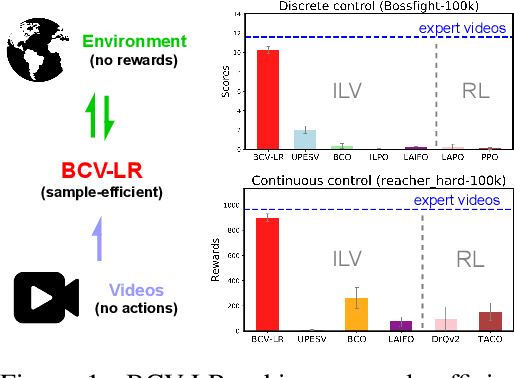
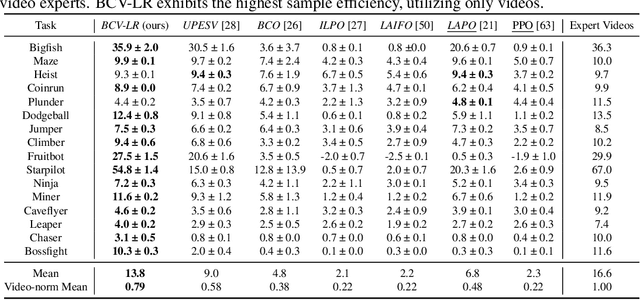


Abstract:Humans can efficiently extract knowledge and learn skills from the videos within only a few trials and errors. However, it poses a big challenge to replicate this learning process for autonomous agents, due to the complexity of visual input, the absence of action or reward signals, and the limitations of interaction steps. In this paper, we propose a novel, unsupervised, and sample-efficient framework to achieve imitation learning from videos (ILV), named Behavior Cloning from Videos via Latent Representations (BCV-LR). BCV-LR extracts action-related latent features from high-dimensional video inputs through self-supervised tasks, and then leverages a dynamics-based unsupervised objective to predict latent actions between consecutive frames. The pre-trained latent actions are fine-tuned and efficiently aligned to the real action space online (with collected interactions) for policy behavior cloning. The cloned policy in turn enriches the agent experience for further latent action finetuning, resulting in an iterative policy improvement that is highly sample-efficient. We conduct extensive experiments on a set of challenging visual tasks, including both discrete control and continuous control. BCV-LR enables effective (even expert-level on some tasks) policy performance with only a few interactions, surpassing state-of-the-art ILV baselines and reinforcement learning methods (provided with environmental rewards) in terms of sample efficiency across 24/28 tasks. To the best of our knowledge, this work for the first time demonstrates that videos can support extremely sample-efficient visual policy learning, without the need to access any other expert supervision.
TakeAD: Preference-based Post-optimization for End-to-end Autonomous Driving with Expert Takeover Data
Dec 22, 2025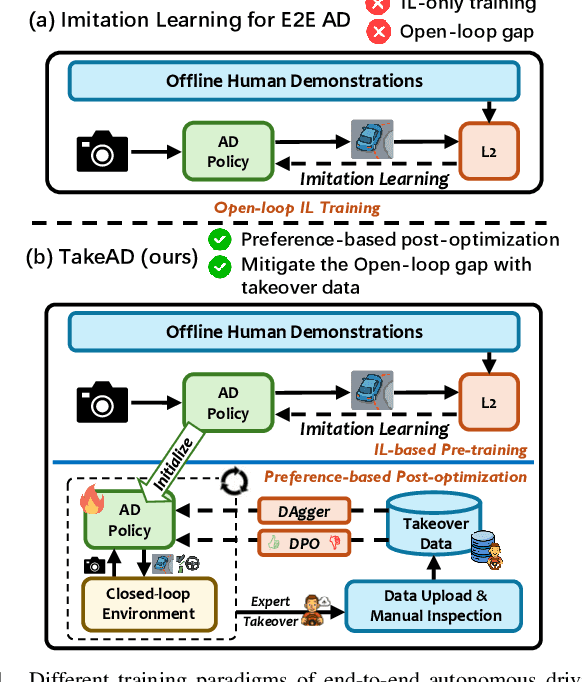
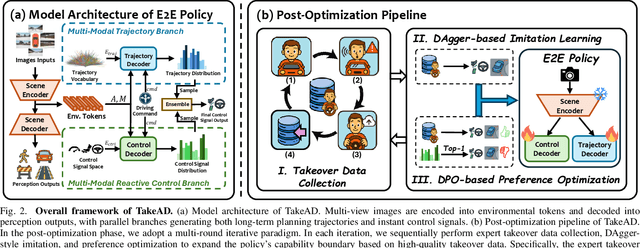
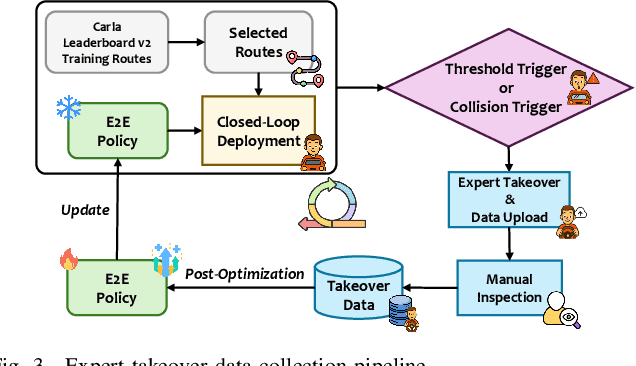
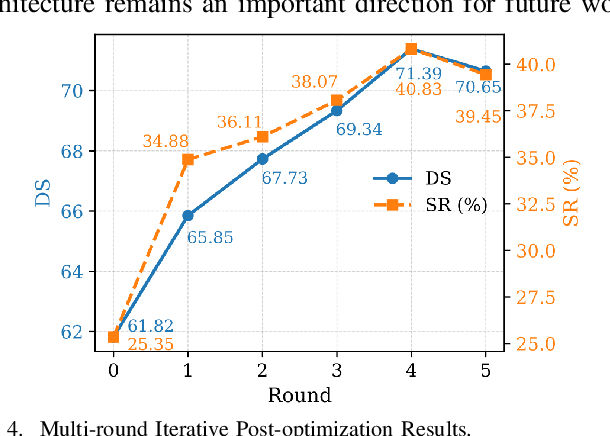
Abstract:Existing end-to-end autonomous driving methods typically rely on imitation learning (IL) but face a key challenge: the misalignment between open-loop training and closed-loop deployment. This misalignment often triggers driver-initiated takeovers and system disengagements during closed-loop execution. How to leverage those expert takeover data from disengagement scenarios and effectively expand the IL policy's capability presents a valuable yet unexplored challenge. In this paper, we propose TakeAD, a novel preference-based post-optimization framework that fine-tunes the pre-trained IL policy with this disengagement data to enhance the closed-loop driving performance. First, we design an efficient expert takeover data collection pipeline inspired by human takeover mechanisms in real-world autonomous driving systems. Then, this post optimization framework integrates iterative Dataset Aggregation (DAgger) for imitation learning with Direct Preference Optimization (DPO) for preference alignment. The DAgger stage equips the policy with fundamental capabilities to handle disengagement states through direct imitation of expert interventions. Subsequently, the DPO stage refines the policy's behavior to better align with expert preferences in disengagement scenarios. Through multiple iterations, the policy progressively learns recovery strategies for disengagement states, thereby mitigating the open-loop gap. Experiments on the closed-loop Bench2Drive benchmark demonstrate our method's effectiveness compared with pure IL methods, with comprehensive ablations confirming the contribution of each component.
DiffuDepGrasp: Diffusion-based Depth Noise Modeling Empowers Sim2Real Robotic Grasping
Nov 17, 2025



Abstract:Transferring the depth-based end-to-end policy trained in simulation to physical robots can yield an efficient and robust grasping policy, yet sensor artifacts in real depth maps like voids and noise establish a significant sim2real gap that critically impedes policy transfer. Training-time strategies like procedural noise injection or learned mappings suffer from data inefficiency due to unrealistic noise simulation, which is often ineffective for grasping tasks that require fine manipulation or dependency on paired datasets heavily. Furthermore, leveraging foundation models to reduce the sim2real gap via intermediate representations fails to mitigate the domain shift fully and adds computational overhead during deployment. This work confronts dual challenges of data inefficiency and deployment complexity. We propose DiffuDepGrasp, a deploy-efficient sim2real framework enabling zero-shot transfer through simulation-exclusive policy training. Its core innovation, the Diffusion Depth Generator, synthesizes geometrically pristine simulation depth with learned sensor-realistic noise via two synergistic modules. The first Diffusion Depth Module leverages temporal geometric priors to enable sample-efficient training of a conditional diffusion model that captures complex sensor noise distributions, while the second Noise Grafting Module preserves metric accuracy during perceptual artifact injection. With only raw depth inputs during deployment, DiffuDepGrasp eliminates computational overhead and achieves a 95.7% average success rate on 12-object grasping with zero-shot transfer and strong generalization to unseen objects.Project website: https://diffudepgrasp.github.io/.
CriticSearch: Fine-Grained Credit Assignment for Search Agents via a Retrospective Critic
Nov 15, 2025Abstract:Tool-Integrated Reasoning (TIR) with search engines enables large language models to iteratively retrieve up-to-date external knowledge, enhancing adaptability and generalization in complex question-answering tasks. However, existing search agent pipelines typically depend on reinforcement learning based optimization, which often suffers from sparse outcome rewards, leading to inefficient exploration and unstable training. We introduce CriticSearch, a fine-grained credit-assignment framework that supplies dense, turn-level feedback via a retrospective critic mechanism. During training, a frozen, asymmetric critique LLM retrospectively evaluates each turn using privileged information from the full trajectory and gold answers, converting these assessments into stable, dense rewards that guide policy improvement. Experimental results across diverse multi-hop reasoning benchmarks demonstrate that CriticSearch consistently outperforms existing baselines, achieving faster convergence, improved training stability, and higher performance.
ARAC: Adaptive Regularized Multi-Agent Soft Actor-Critic in Graph-Structured Adversarial Games
Nov 11, 2025



Abstract:In graph-structured multi-agent reinforcement learning (MARL) adversarial tasks such as pursuit and confrontation, agents must coordinate under highly dynamic interactions, where sparse rewards hinder efficient policy learning. We propose Adaptive Regularized Multi-Agent Soft Actor-Critic (ARAC), which integrates an attention-based graph neural network (GNN) for modeling agent dependencies with an adaptive divergence regularization mechanism. The GNN enables expressive representation of spatial relations and state features in graph environments. Divergence regularization can serve as policy guidance to alleviate the sparse reward problem, but it may lead to suboptimal convergence when the reference policy itself is imperfect. The adaptive divergence regularization mechanism enables the framework to exploit reference policies for efficient exploration in the early stages, while gradually reducing reliance on them as training progresses to avoid inheriting their limitations. Experiments in pursuit and confrontation scenarios demonstrate that ARAC achieves faster convergence, higher final success rates, and stronger scalability across varying numbers of agents compared with MARL baselines, highlighting its effectiveness in complex graph-structured environments.
Empowering Multi-Robot Cooperation via Sequential World Models
Sep 16, 2025Abstract:Model-based reinforcement learning (MBRL) has shown significant potential in robotics due to its high sample efficiency and planning capability. However, extending MBRL to multi-robot cooperation remains challenging due to the complexity of joint dynamics. To address this, we propose the Sequential World Model (SeqWM), a novel framework that integrates the sequential paradigm into model-based multi-agent reinforcement learning. SeqWM employs independent, sequentially structured agent-wise world models to decompose complex joint dynamics. Latent rollouts and decision-making are performed through sequential communication, where each agent generates its future trajectory and plans its actions based on the predictions of its predecessors. This design enables explicit intention sharing, enhancing cooperative performance, and reduces communication overhead to linear complexity. Results in challenging simulated environments (Bi-DexHands and Multi-Quad) show that SeqWM outperforms existing state-of-the-art model-free and model-based baselines in both overall performance and sample efficiency, while exhibiting advanced cooperative behaviors such as predictive adaptation and role division. Furthermore, SeqWM has been success fully deployed on physical quadruped robots, demonstrating its effectiveness in real-world multi-robot systems. Demos and code are available at: https://github.com/zhaozijie2022/seqwm-marl
Survey of Vision-Language-Action Models for Embodied Manipulation
Aug 21, 2025Abstract:Embodied intelligence systems, which enhance agent capabilities through continuous environment interactions, have garnered significant attention from both academia and industry. Vision-Language-Action models, inspired by advancements in large foundation models, serve as universal robotic control frameworks that substantially improve agent-environment interaction capabilities in embodied intelligence systems. This expansion has broadened application scenarios for embodied AI robots. This survey comprehensively reviews VLA models for embodied manipulation. Firstly, it chronicles the developmental trajectory of VLA architectures. Subsequently, we conduct a detailed analysis of current research across 5 critical dimensions: VLA model structures, training datasets, pre-training methods, post-training methods, and model evaluation. Finally, we synthesize key challenges in VLA development and real-world deployment, while outlining promising future research directions.
SRFT: A Single-Stage Method with Supervised and Reinforcement Fine-Tuning for Reasoning
Jun 24, 2025Abstract:Large language models (LLMs) have achieved remarkable progress in reasoning tasks, yet the optimal integration of Supervised Fine-Tuning (SFT) and Reinforcement Learning (RL) remains a fundamental challenge. Through comprehensive analysis of token distributions, learning dynamics, and integration mechanisms from entropy-based perspectives, we reveal key differences between these paradigms: SFT induces coarse-grained global changes to LLM policy distributions, while RL performs fine-grained selective optimizations, with entropy serving as a critical indicator of training effectiveness. Building on these observations, we propose Supervised Reinforcement Fine-Tuning (SRFT), a single-stage method that unifies both fine-tuning paradigms through entropy-aware weighting mechanisms. Our approach simultaneously applies SFT and RL to directly optimize the LLM using demonstrations and self-exploration rollouts rather than through two-stage sequential methods. Extensive experiments show that SRFT achieves 59.1% average accuracy, outperforming zero-RL methods by 9.0% on five mathematical reasoning benchmarks and 10.9% on three out-of-distribution benchmarks.
DipLLM: Fine-Tuning LLM for Strategic Decision-making in Diplomacy
Jun 11, 2025



Abstract:Diplomacy is a complex multiplayer game that requires both cooperation and competition, posing significant challenges for AI systems. Traditional methods rely on equilibrium search to generate extensive game data for training, which demands substantial computational resources. Large Language Models (LLMs) offer a promising alternative, leveraging pre-trained knowledge to achieve strong performance with relatively small-scale fine-tuning. However, applying LLMs to Diplomacy remains challenging due to the exponential growth of possible action combinations and the intricate strategic interactions among players. To address this challenge, we propose DipLLM, a fine-tuned LLM-based agent that learns equilibrium policies for Diplomacy. DipLLM employs an autoregressive factorization framework to simplify the complex task of multi-unit action assignment into a sequence of unit-level decisions. By defining an equilibrium policy within this framework as the learning objective, we fine-tune the model using only 1.5% of the data required by the state-of-the-art Cicero model, surpassing its performance. Our results demonstrate the potential of fine-tuned LLMs for tackling complex strategic decision-making in multiplayer games.
 Add to Chrome
Add to Chrome Add to Firefox
Add to Firefox Add to Edge
Add to Edge